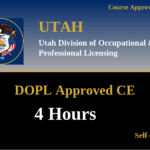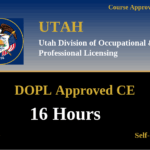
Starting an Electrical Contractor Business in Utah
From Spark to Success: A Guide to Starting an Electrical Contractor Business in Utah
Utah’s dynamic economy and growing communities present a golden opportunity for skilled tradespeople. For an experienced journeyman or master electrician, the dream of being your own boss, setting your own hours, and building a legacy is more attainable than ever. But transforming your technical expertise into a thriving electrical contractor business in Utah requires more than just knowing your way around a circuit panel. It demands a strategic approach to licensing, legal setup, and business management. This guide offers industry perspective on the path from a skilled tradesperson to a successful business owner, covering the critical steps regulated by Utah’s Division of Occupational and Professional Licensing (DOPL).
The Foundation: Understanding Utah’s Contractor Licenses
First, it’s crucial to understand the distinction between holding an electrician license (like a Journeyman or Master license) and an electrical contractor license. Your individual license proves your technical proficiency, while a contractor license authorizes you to operate a business, hire employees, advertise services, and enter into contracts for electrical projects. While Utah offers a “handyman” exemption for certain small projects under $3,000, this exemption generally does not apply to electrical work that requires a permit. Utah offers two primary classifications for electrical contractors, and your choice will define the scope of your business.
Choosing Your Path: S200 vs. S201 Contractor Licenses
The DOPL issues two main types of electrical contractor licenses, each with a specific field of operation and qualifier requirement:
S200 General Electrical Contractor: This is the most comprehensive license, allowing your business to perform work in residential, commercial, and industrial settings. To qualify for a Utah electrical contractor license under the S200 classification, your company must have a designated qualifier who holds an active Master Electrician Utah license.
S201 Residential Electrical Contractor: This license restricts your business to electrical work in residential properties only. The qualifier for an S201 license can be either a licensed Residential Master Electrician or a Master Electrician. This is an excellent option for those specializing as a residential electrician.
The qualifier is the licensed individual responsible for supervising all electrical work performed by the company, ensuring it meets code and quality standards.
The Five Pillars of Launching Your Electrical Contractor Business in Utah
Building a successful contracting business is like wiring a complex system; each component must be correctly installed for the whole to function properly. Here are the five essential pillars you must put in place.
Pillar 1: Legal Structure and Registration
Before you even think about the DOPL electrical application, you must establish your business as a legal entity. This involves choosing a structure, such as an LLC, S-Corp, or Partnership. According to the Utah Division of Corporations, most business structures must be formally registered. This Utah Division of Corporations registration gives your business legal standing and is a prerequisite for your contractor license application. You will also need to obtain an Employer Identification Number (EIN) from the IRS and register with the Utah State Tax Commission for any applicable taxes, such as withholding for employees or sales tax on materials.
Pillar 2: Pre-Licensure Education and Examination
Utah ensures its contractors are well-versed in both their trade and the legalities of running a business. All applicants for an S200 or S201 license must complete a mandatory 25-hour pre-licensure course from a DOPL-approved provider. This course covers critical topics like lien laws, business management, and regulatory compliance. Following the course, you must pass the Utah business and law exam. It’s important to note that even a licensed Master Electrician must pass this exam to become a contractor.
Pillar 3: Financial Safeguards – Insurance and Bonding
Protecting your business, your clients, and your employees is non-negotiable. The DOPL requires proof of specific insurance coverage:
- Electrical contractor insurance Utah (General Liability): You must carry a general liability policy with minimum limits of $100,000 per occurrence and $300,000 in the aggregate. DOPL must be listed as a certificate holder.
- Workers’ compensation for electricians: If you have any employees—even one—you are required by the Utah Labor Commission to have a workers’ compensation policy. If you are a sole proprietor with no employees, you can apply for a waiver.
Additionally, a Utah contractor license bond in the amount of $15,000 may be required. This is mandatory unless your business can meet DOPL’s financial responsibility requirements, such as proving a minimum net worth.
Pillar 4: Building Your Expertise – The Path to Qualifier
The heart of your contracting business is your technical expertise. The journey to becoming a Master Electrician—the qualifier for the S200 license—is a multi-year process. It starts with an electrical apprenticeship in Utah, where you gain hands-on experience while attending an electrician school for theoretical knowledge. After completing the required hours and schooling, you can test to become a journeyman electrician. The Journeyman electrician requirements in Utah typically involve about 8,000 hours of training over four years, which must include a set number of classroom hours (e.g., 576 hours for a standard apprenticeship). From there, a Journeyman must gain an additional 4,000 to 8,000 hours of work experience (depending on their educational path) before being eligible to take the exams to become a Master Electrician Utah.
Pillar 5: Staying Compliant and Current
The electrical industry is constantly evolving. Adherence to the latest safety standards is mandatory. Utah currently operates on the National Electrical Code (NEC) Utah 2023 edition, which became effective on July 1, 2024, with several state-specific amendments. Understanding these rules, such as how the 2023 NEC changes dwelling unit load calculations or the rules for how many service disconnecting means are allowed, is vital for compliance and safety. For individual license renewal, Utah requires 16 hours of continuing education for electricians Utah every two years, with at least 12 of those hours designated as ‘core education,’ specifically consisting of eight hours covering the National Electrical Code (NEC) and four hours covering NFPA 70E safety standards. Keeping up-to-date with topics like NEC service equipment labeling requirements through high-quality online electrical courses is key to maintaining your license and expertise. It’s important to remember that while your individual electrician license renews on November 30 of even-numbered years, your contractor license has a separate renewal cycle, due November 30 of odd-numbered years.
Growing Your Business and Building Your Team
Once your business is established, your focus will shift to growth. As an S200 or S201 contractor, you can hire other licensed Journeyman and apprentice electricians to work under your supervision. This allows you to scale your operations, take on more projects, and build a reputation for quality work in the Utah market. Remember, as the qualifying Master Electrician, you are ultimately responsible for all work performed by your team, making proper training and oversight essential for long-term success.
Launching your own electrical contracting company is a significant undertaking, but with careful planning and a thorough understanding of the requirements, it is a deeply rewarding career path. By building on these five pillars, you can create a business that is not only profitable but also a respected and trusted name in Utah’s construction industry. When you are ready to fulfill your continuing education requirements, be sure to browse our courses to find state-approved, engaging options that fit your schedule.
Utah Continuing Education Courses
Explore our board-approved continuing education courses for Utah professionals:
View CE RequirementsUtah 2024 NFPA 70E Electrical Safety
Utah 2023 NEC Code Changes 16 Hours with 4 Hours NFPA 70E
Disclaimer: The information provided in this educational content has been prepared with care to reflect current regulatory requirements for continuing education. However, licensing rules and regulations can vary by state and are subject to change. While we strive for accuracy, ExpertCE cannot guarantee that all details are complete or up to date at the time of reading. For the most current and authoritative information, always refer directly to your state’s official licensing board or regulatory agency.
NEC®, NFPA 70E®, NFPA 70®, and National Electrical Code® are registered trademarks of the National Fire Protection Association® (NFPA®)






